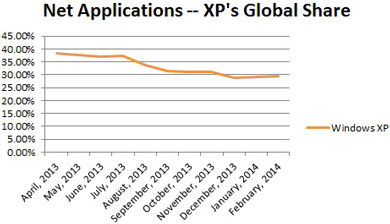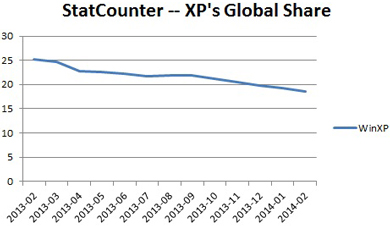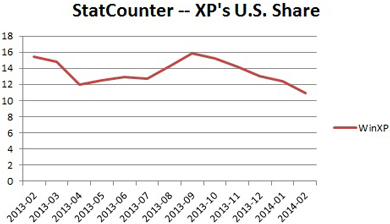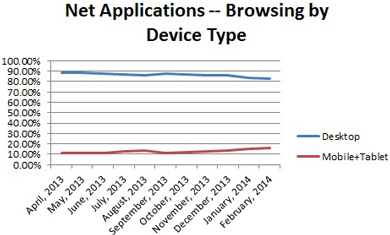News
Not Dead Yet: Windows XP Won't Go Away
Even with support ending April 8, Windows XP still hangs on, even gaining market share according to some metrics.
- By Scott Bekker
- 03/10/2014
Windows XP reaches the end of its support life in less than a month, but it continues to be popular. Just how popular is a matter of debate, but one thing that's clear is that Microsoft is still having a hard time convincing the public to upgrade to Windows 8; whether because they love Windows XP, or are scared of the hybrid Windows 8 is unknown.
For instance, Net Applications reported data this week suggesting that through February, Windows XP not only stuck around but gained a little share for the second month in a row. Another measure by StatCounter showed a drop in use.
According to Net Applications, Windows XP use went from 28.98 percent share of desktop operating systems worldwide in December to 29.30 percent in January and then to 29.53 percent in February. Past figures show Windows XP dropping in a stair-step pattern from the high of 30 percent through July, then settling around 31 percent in September and October before dropping into the current 29 percent range, where it's stayed for the last three months. It suggests no acute shift by late movers, despite the impending deadline.

Another market research firm showed a different trend, with Windows XP use steadily falling away. StatCounter has shown Windows XP's global share to be much lower over the course of the last year -- starting out last February at only 25 percent and dropping relatively smoothly to 18.6 percent for February 2014.

Domestically, StatCounter put Windows XP's U.S. share even lower. The OS had a weird trough where it dropped from February 2013 to April 2013 then started climbing again. But since reaching nearly 16 percent share in September, StatCounter has shown XP's usage share falling rapidly to 10.93 percent in February 2014.

Both StatCounter and Net Applications track browser-use information, but their approaches differ. StatCounter relies on pageviews, while Net Applications uses unique visitors.
It's hard to say what's accounting for the difference, but one other metric tracked by Net Applications hints at an interesting possibility. Net Applications also tracks browsing by device type. In the last few months, its stats have shown a strong gain in the "mobile + tablet" browsing category at the expense of desktop browsing.

Could we be looking at Windows XP users continuing to access the Web at similar rates as in the past, while adopters of newer operating systems are increasingly browsing with tablets and smartphones? Could that give Windows XP an apparent bump in desktop share even as the old OS' share is actually dropping?
Either way, it could represent a difficult situation for Microsoft. For instance, one possibility is that Windows XP's share isn't falling, in which case Microsoft could face stark choices about its responsibility. Continued Windows XP use could represent a security problem for the entire Internet, not just for customers who don't upgrade. The other possibility is that mobile browsing, in which Microsoft is still not a significant player, is really taking off.
About the Author
Scott Bekker is editor in chief of Redmond Channel Partner magazine.